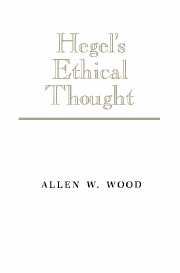Summary
Hegel and freedom
In Hegel's self-actualization theory, the essence of the self to be actualized goes by the name of “freedom.” What does Hegel mean by “freedom”?
In the liberal tradition, “freedom” usually refers to a sphere of privacy in which individuals may do as they please, immune from the interference of others – especially of the state. For liberals, to value “freedom” means to insist that there are definite limits to legitimate interference with individuals; the main issues about freedom have to do with where these limits are to be set. Hegel also believes that the state's power over individuals should be limited, and takes the existence of such limits to be a distinctive feature of modern ethical life (PR §§ 41, 185R, 206,R, 262A, 299R). He criticizes Fichte for advocating too much state regulation of people's lives – he is particularly outraged by Fichte's suggestion that citizens should be required to carry around identification passbooks with their pictures in them (VPR4: 617; PR Preface 25; VPR17: 139; cf. GNR 291–303/374–387). Hegel insists that the police should not be permitted to enter private residences without a special order, and he says of the British use of “police spies” to detect and prevent crime that this practice opens the way to “the greatest abyss of corruption” (VPRiy : 139).
Nevertheless, Hegel does not see issues about freedom as liberals see them, and his agenda regarding freedom is not the liberal one.
- Type
- Chapter
- Information
- Hegel's Ethical Thought , pp. 36 - 52Publisher: Cambridge University PressPrint publication year: 1990

